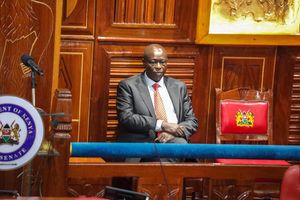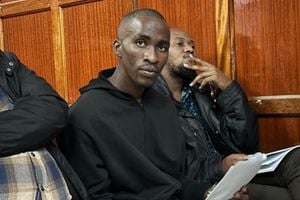'Race and gender tax': Inside South Africa banks' interest rate scandal targeting black women

A woman at an ATM. In 2019, a branch manager of WesBank, noticed the discrimination of banks towards blacks, especially black women, who were paying up to 19 percent interest as whites paid 11.25 percent.
What you need to know:
- In South Africa's banking sector, Black women are systematically charged higher interest rates compared to white clients.
- The discrimination was uncovered when Shaheeda Moosa discovered how her BMW purchase contract was fraudulently modified, leading her to connect with 800 other Black South Africans who had been similarly swindled by banks and dealerships.
- The systemic racism runs so deep that when financial investigator Emerald Van Zyl attempted to expose First National Bank's racial disparity in court, he was mysteriously poisoned.
On January 28, 2017, a colleague recommended Johannesburg's Melrose Arch BMW dealership to Shaheeda Moosa. The car dealership was expediting a special offer on new vehicles for clients who intended to trade in their cars for brand new BMWs. Shaheeda visited the dealership and during an inquisition, she was persuaded by a salesperson to trade in her 2013 Hyundai ix35 for a new BMW.
The salesperson consequently advised Shaheeda that if she traded in her second car, a 2011 Mini Cooper Countryman together with the Hyundai, she would qualify for two BMWs. She was subsequently instructed that her monthly instalment procedure for the two BMWs she intended to acquire would last for three years and would eventually accumulate to 500,000 rands upon completion.
Blinded by the charm of her new acquisitions, Shaheeda relinquished both her Hyundai and Mini Cooper to Melrose Arch, and drove home in a brand new BMW 320d GT M-Sport in delirium. A week later, she acquired a brand new BMW X1.
Four months after the transaction, Shaheeda noticed anomalies that led her to scrutinise the purchases. She uncovered how her signature was forged and deceptively used to include add-ons and incremental extras that were discreetly attached to her vehicle purchase contract without her consent. The malicious modifications doubled the cumulative cost of both BMWs to one million rands, with the monthly instalment cost superseding her monthly income.
She phoned Melrose Arch dealership and the salespeople denied her a hearing and when she visited their offices, their attorneys unceremoniously asked her to vacate their premises. Shaheeda later came to the understanding that South African banks are the epicentre of racism, deceit and fraud. She uncovered how Melrose Arch, together with Mercantile Bank, scammed clients in a ponzi scheme and invested their returns in an off-shore account. During her seven-year quest for justice, she interacted with over 800 Black South Africans who had been swindled by the banks.
One of the victims she met was Mzukisi Ndara, a director of communication at the Eastern Cape Department of Health. Mzukisi had traded in his Nissan Almera for a Nissan X-trail, at a WesBank agency known as Datnis Nissan Dealership in King Williams Town, Eastern Cape, in December 2004.
Eight months later in August 2005, he discovered that when Datnis manager Van Aardt sold him the second-hand X-trail, which had a mileage of 7,000km, he mischievously invoiced it to him as a brand new vehicle. Van Aardt then illegally added items that are classified as extras, without Mzukisi's knowledge.
A brand new Nissan X-trail retailed at 295,990 rands at the time of the purchase, yet the cost of Mzukisi's second-hand Nissan X-trail was illegally inflated to 330,000 rands. According to Mzukisi's memoir, A Quest for Justice: David & Goliath Battle; Man's Courage Exposes Bank's Patronage, the banks continue to exploit the collapse of consumer protection in South Africa. The National Credit Regulator colludes with banks to marginalise blacks, thus banks operate with impunity.

Mzukisi Ndara's memoir, A Quest for Justice: David & Goliath Battle; A Man's Courage Exposes Bank's Patronage.
During Mzukisi's subsequent investigation, he detected that South African banks were infiltrated by apartheid-inspired racial profiling and indulged in racially prejudiced lending practices. He made a distinctive observation that WesBank charges its black clients higher interest rates for vehicle financing than their white counterparts.
In 2019, a whistle-blower, a branch manager of WesBank, phoned reputable South African financial investigator Emerald Van Zyl to inform him that blacks were paying higher interest rates than whites. Emerald then posted on Twitter requesting everyone who had a vehicle purchase contract with WesBank to send copies to him. He received 160 contracts from blacks and 52 from whites. He noticed the discrimination of banks towards blacks, especially black women, who were paying up to 19 percent interest as whites paid 11.25 percent.
A second whistle-blower, who works at the Information Technology department in a WesBank branch, phoned Emerald. He said that before a vehicle loan is approved, the race of the client has to be explicitly declared in his docket, in a determination to oppress and disenfranchise a growing black middle-class, dominated by women.
South African corporate industry is still predominantly Caucasian and the banks maintain an inclination to suppress the black population. In his expedition for retribution, Emerald approached Ghana Msibi, a former executive of First Rand Bank, Africa’s largest lender by market value, and the then CEO of WesBank. He presented him with three contracts from white clients and three from blacks, with the contracts vividly indicating how black clients were paying over eight percent interest while whites were paying 1.2 percent. Msibi refuted the glaring evidence.
In 2013, First National Bank, a vehicle and asset finance institution of First Rand Bank, was summoned to court after Emerald filed a case on the bank's racial disparity. On the first day of court proceedings at the Jo'burg Equality Court, Emerald was mysteriously poisoned and admitted to an intensive care unit. He was then flown to Cape Town for emergency surgery. In his absence, FNB lawyers convinced the court that they had the legal prerogative to charge interest rates as they pleased.
The writer is a novelist, Big Brother Africa 2 Kenyan representative and founder of Jeff's Fitness Centre (@jeffbigbrother).





